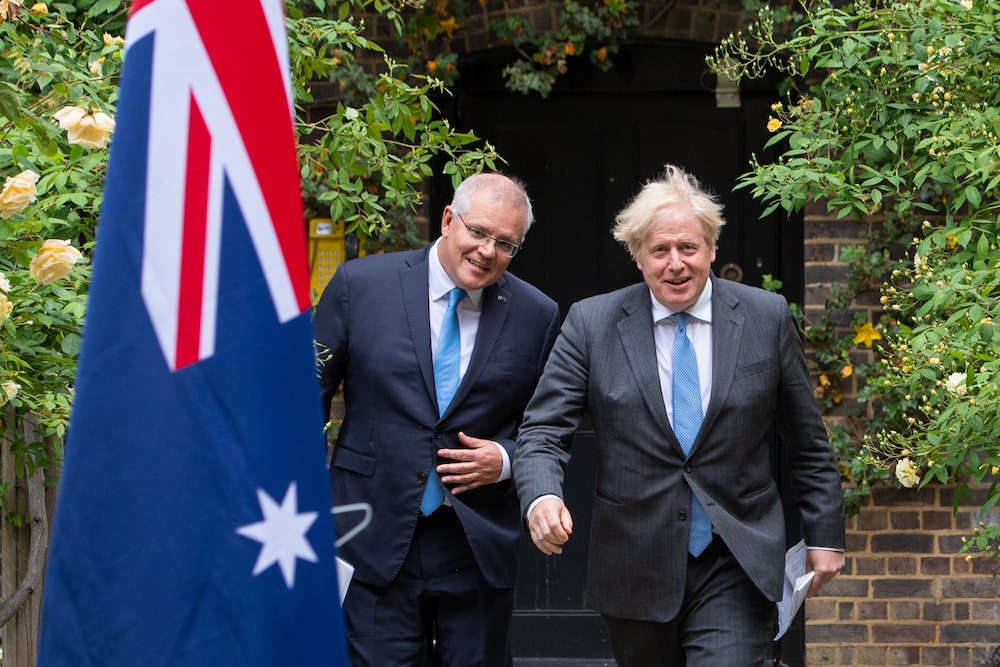We’re being told about the new Australia-UK Free Trade Agreement, but not a lot about most of what’s in it.
After an in-principle agreement overnight, Australia released a five-page summary.
Australian farmers will benefit from tariff-free access to the UK for limited amounts of Australian beef, lamb, sugar and dairy products to the UK (but will have to wait ten years for the full elimination of tariffs). Australian consumers will benefit from immediate zero tariffs on products like UK whiskey and cars. Longer working holiday visas may be available for citizens from both countries.
It will take at least a month for the deal to be finalised and signed, and only after the signing will the Australian public see the full text and a parliamentary committee be given the right to inquire into it but not change it.
This secrecy continues what’s become something of a tradition — one that has attracted the ire of the Productivity Commission which in 2010 recommended the government commission and publish an independent and transparent assessment of future free trade agreements “at the conclusion of negotiations but before an agreement is signed”.
The parliament’s joint standing committee on treaties (the same one that will examine this agreement) began inquiring into the system mid last year and took many submissions, but still has not reported.
As many as 30 unseen chapters
The timing of the deal is driven by the UK’s post-Brexit desperation to sign one-on-one agreements and the greater prize of being part of the 11-nation Comprehensive and Progressive Trans-Pacific Partnership (CPTPP) including Japan, Australia, Canada, New Zealand, Vietnam, Singapore, Malaysia, Brunei, Mexico, Chile and Peru which the UK has applied to join.
Like the CPTPP, the Australia-UK Free Trade Agreement is likely to have as many as 30 chapters, some of which restrict the ability of governments to regulate in fields including medicines, essential services and data privacy.
UK trade minister Greg Hands said last month he wants the deal to include investor-state dispute settlement (ISDS) provisions of the kind excluded from the Australia-European Union current trade talks, and from the Regional Comprehensive Economic Partnership recently signed with Japan, China, South Korea, New Zealand and the 10 ASEAN countries.
The provisions would allow UK firms to sue Australian governments in international tribunals over decisions they believed infringed on their interests in a way Australian firms cold not.
In return Australian firms could sue UK authorities in a way UK firms could not.
But UK companies are more frequent users of ISDS, having launched 90 recorded ISDS cases, the third most after the US and the Netherlands. Australian companies have launched nine.
Defending the idea in the House of Commons, Hands said the UK had “never lost an ISDS case”.
There are now 1,104, known ISDS cases with increasing numbers against health and environment laws, including laws to address climate change and to protect indigenous rights.
Australians remember that the US Philip Morris tobacco company used an obscure Hong Kong investment agreement to sue Australia for billions over our plain packaging law.
Read more: Last to know: the EU knows more about our trade talks than we do
It took the international tribunal almost five years to decide that Philip Morris was not a Hong Kong company as it had claimed. Australia had to pay $12 million in legal costs.
ISDS rules in the Australia-UK treaty would give UK mining companies such as Rio Tinto the right to claim compensation for new laws to protect Indigenous heritage areas, and UK aged care companies such as Bupa the right to claim compensation for new regulations arising from the Aged Care Royal Commission.
Longer pharmaceutical monopolies
The UK has also said in its negotiating objectives that it wants to preserve its “existing intellectual property standards” which include rules that provide for longer data protection monopolies on medicines than Australia has.
The UK also supported this demand as a member of the EU before Brexit when it was published by the EU as part of the ongoing EU-Australia FTA negotiations.
Pharmaceutical companies already have 20 year monopolies on new medicines.
Read more: Planned trade deal with Europe could keep medicine prices too high
The UK has an additional “data protection” monopoly of up to ten years before data is released enabling production of cheaper competitors.
The current Australian standard is five years. Adopting the UK standard would delay the availability of cheaper medicines, costing Australia’s Pharmaceutical Benefits Scheme hundreds of millions of dollars per year.
Unless the text is released before it is signed, we won’t know whether ISDS and longer medicine monopolies are part of the deal.
The Australian government should release the text for public scrutiny and independent assessment of its costs and benefits before it is signed, so that we are able to see what is being traded away before it’s too late.
By Patricia Ranald, Honorary research fellow, University of Sydney
This article, There’s a lot we don’t know about the UK trade agreement we are about to sign, is republished from The Conversation under a Creative Commons license.
For more from The Conversation:




